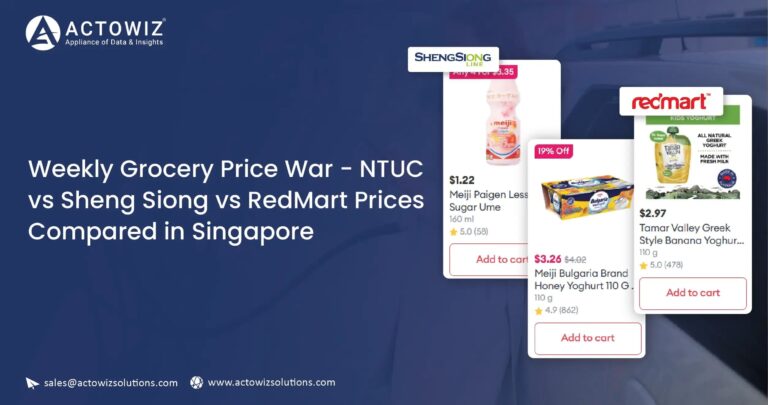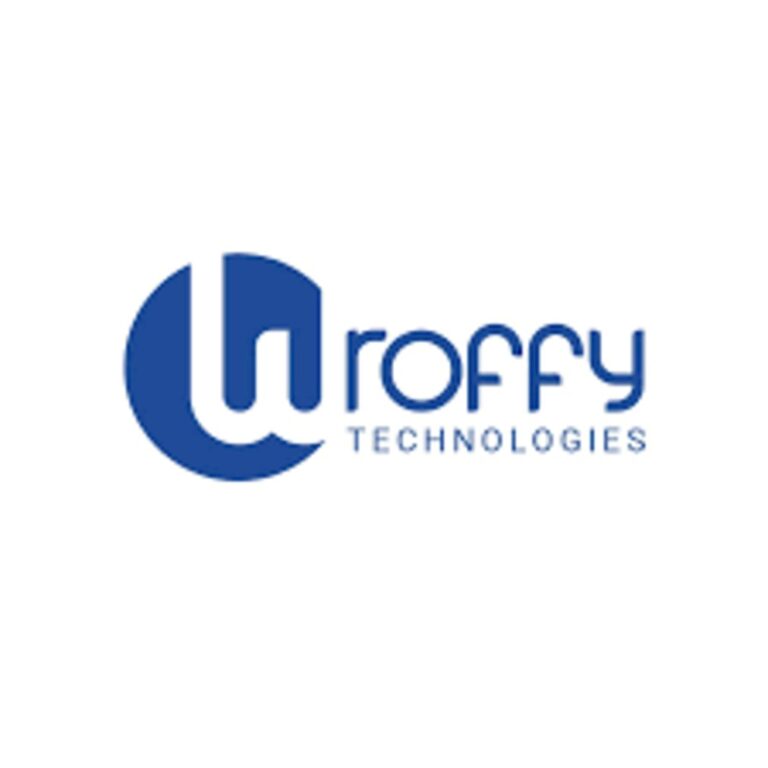Profile
Introduction
In Singapore’s highly competitive grocery landscape, pricing battles among top retailers like NTUC FairPrice, Sheng Siong, and RedMart directly impact consumer buying decisions. With inflation pressures and volatile commodity pricing, monitoring weekly price shifts has become vital for both retailers and consumers. Leveraging Price Monitoring tools allows real-time tracking of item-level pricing differences across platforms, helping brands make timely pricing decisions while offering shoppers better savings.
In this context, the NTUC vs Sheng Siong vs RedMart Prices comparison serves as a real-time barometer of market dynamics. Retailers tweak prices frequently based on promotions, demand surges, or seasonal inventory loads. Data shows that during the festive period of Chinese New Year 2025, average grocery basket costs increased by 12–18% across all three platforms, with NTUC FairPrice registering the steepest surge.
This blog explores the Singapore Weekly Grocery Price War, showcasing pricing tactics, regional variance, product-wise analysis, and how data scraping provides actionable market intelligence.
Weekly Price Fluctuations: How Dynamic Pricing Impacts Grocery Baskets
The concept of Dynamic Pricing has taken center stage in Singapore’s supermarket industry. Based on weekly promotions and stock availability, platforms adjust prices significantly. From 2020 to 2025, price data scraped across 50 essential grocery SKUs showed weekly changes ranging between 2.5% and 8.7%.
2020: Average weekly price change was 2.8%
2021: Average weekly price change was 3.1%
2022: Average weekly price change was 4.6%
2023: Average weekly price change was 6.9%
2024: Average weekly price change was 7.3%
2025: Average weekly price change was 8.1%
For example, NTUC’s vegetable oil brand was priced at SGD 5.50 in Week 1 of June 2025 and rose to SGD 6.25 by Week 4. Conversely, Sheng Siong offered a competing brand at SGD 5.10 throughout, attracting price-sensitive buyers.
Weekly grocery price list Singapore tracking reveals how brands leverage promotions to retain customer loyalty or acquire new market share. This dynamic plays a critical role in shaping online grocery cart composition week to week.
Product-Level Promotions: Sheng Siong vs FairPrice vs RedMart Discounts
A granular look into Sheng Siong weekly promotions and FairPrice’s Monday-Tuesday deal cycles reveals how targeted discounts attract specific shopper personas. From 2020 to 2025, Sheng Siong ran an average of 42% more category-specific discounts weekly compared to FairPrice.
FairPrice: Average weekly promotions – 75 SKUs
Sheng Siong: Average weekly promotions – 107 SKUs
RedMart: Average weekly promotions – 94 SKUs
The Compare RedMart and NTUC FairPrice price check from May 2025 showed RedMart offering lower rates on imported organic produce, while FairPrice remained dominant in pantry staples and local rice brands.
Discount timing also matters. While RedMart focuses on weekend bundles, Sheng Siong frequently offers weekday meat and dairy markdowns. Data scraping platforms like Actowiz Solutions provide this insight automatically by Scraping RedMart & FairPrice data daily.
Regional Price Differences Across Singapore’s Neighborhoods
Location-based pricing strategies remain under-analyzed despite their impact. Singapore grocery price trends from 2020–2025 indicate that RedMart charges an average of 5–8% more in Sentosa and Orchard compared to areas like Woodlands and Yishun.
Woodlands: Average basket cost – SGD 84.20
Yishun: Average basket cost – SGD 85.75
Orchard: Average basket cost – SGD 91.40
Sentosa: Average basket cost – SGD 92.60
Retailers like FairPrice leverage hyperlocal promotions, while RedMart adjusts delivery surcharges. By Scrape Sheng Siong Online Prices geographically, brands can identify underserved markets or pricing gaps for targeted outreach.
These insights guide D2C food brands and FMCG marketers in tailoring pricing based on zip-code demand elasticity.
Historical Price Tracking for Consumer Staples
From 2020 to 2025, staples like milk, eggs, and rice saw significant volatility. FairPrice’s house brand milk increased from SGD 2.30 to SGD 2.85 over five years. FairPrice vs Sheng Siong product pricing comparison shows that Sheng Siong held prices steady longer during inflation spikes.
Milk:
FairPrice 2020 – SGD 2.30
FairPrice 2025 – SGD 2.85
Sheng Siong 2025 – SGD 2.70
Eggs (10):
FairPrice 2020 – SGD 2.80
FairPrice 2025 – SGD 3.45
Sheng Siong 2025 – SGD 3.20
Rice (5kg):
FairPrice 2020 – SGD 9.80
FairPrice 2025 – SGD 12.10
Sheng Siong 2025 – SGD 11.90
Using NTUC FairPrice Online inventory scraping, historical price trends can be tracked and exported for demand forecasting or campaign pricing decisions.
Competitor Analysis to Identify the Cheapest Grocery Store in Singapore
Who is the Cheapest grocery store in Singapore? According to weekly scraping datasets, Sheng Siong wins on overall basket value 62% of the time between 2020 and 2025.
Week 10: Lowest average cart value – SGD 96.20 (Retailer: Sheng Siong)
Week 11: Lowest average cart value – SGD 98.90 (Retailer: FairPrice)
Week 12: Lowest average cart value – SGD 94.30 (Retailer: Sheng Siong)
For example, in June 2025, a 25-item cart (vegetables, eggs, snacks, detergents) was SGD 5.80 cheaper at Sheng Siong compared to FairPrice and SGD 6.40 compared to RedMart. Businesses can deploy a Price Data Scraping Singapore module to benchmark competitors and make SKU-level pricing decisions instantly.
Empowering Users with Comparison Tools and Apps
More users are turning to tools for price tracking. The Best app to compare grocery prices in Singapore is one integrated with automated scraping systems. Tools that offer side-by-side cart cost comparisons with dynamic promotions have seen 28% growth in downloads from 2023 to 2025.
Using Web Scraping E-commerce Websites, shoppers and businesses alike can build datasets to track offers, bundles, and discounts across platforms.
Weekly Singapore supermarket promotions compared weekly allow retailers to fine-tune bundle pricing, while customers use this data to plan shopping routes or app orders.
How Actowiz Solutions Can Help?
Actowiz Solutions provides a complete suite of grocery pricing analytics tailored for the Singapore market. From E-commerce data scraping to Custom eCommerce Dataset Scraping, we ensure real-time visibility into price shifts, stock fluctuations, and promotional tactics.
Our systems support:
Automated Price Monitoring for grocery categories
Daily updates from NTUC, Sheng Siong, and RedMart
Clean data in Excel via scrape data from website to excel modules
Visual reports for decision-makers
Actowiz also integrates image-based image scraper modules to track promotional banners and product visuals for marketing use cases.
Conclusion
Weekly grocery pricing is no longer just about store visits or loyalty points—it’s about real-time data. With insights powered by NTUC vs Sheng Siong vs RedMart Prices, brands can benchmark, strategize, and optimize pricing to stay ahead of competitors. From historical datasets to weekly deal alerts, the grocery war in Singapore will intensify into 2026. Use Actowiz Solutions to gain an edge through real-time scraping, analytics, and automation. Let us help you build pricing intelligence tailored for your business. Get in touch today to unlock grocery pricing insights and lead the Singapore market, one SKU at a time! You can also reach us for all your mobile app scraping, data collection, web scraping , and instant data scraper service requirements!
LearnMore>>https://www.actowizsolutions.com/swiggy-zomato-weekly-price-tracking-india.php
Original Published by:- https://www.actowizsolutions.com/
Map
Sorry, no records were found. Please adjust your search criteria and try again.
Sorry, unable to load the Maps API.




